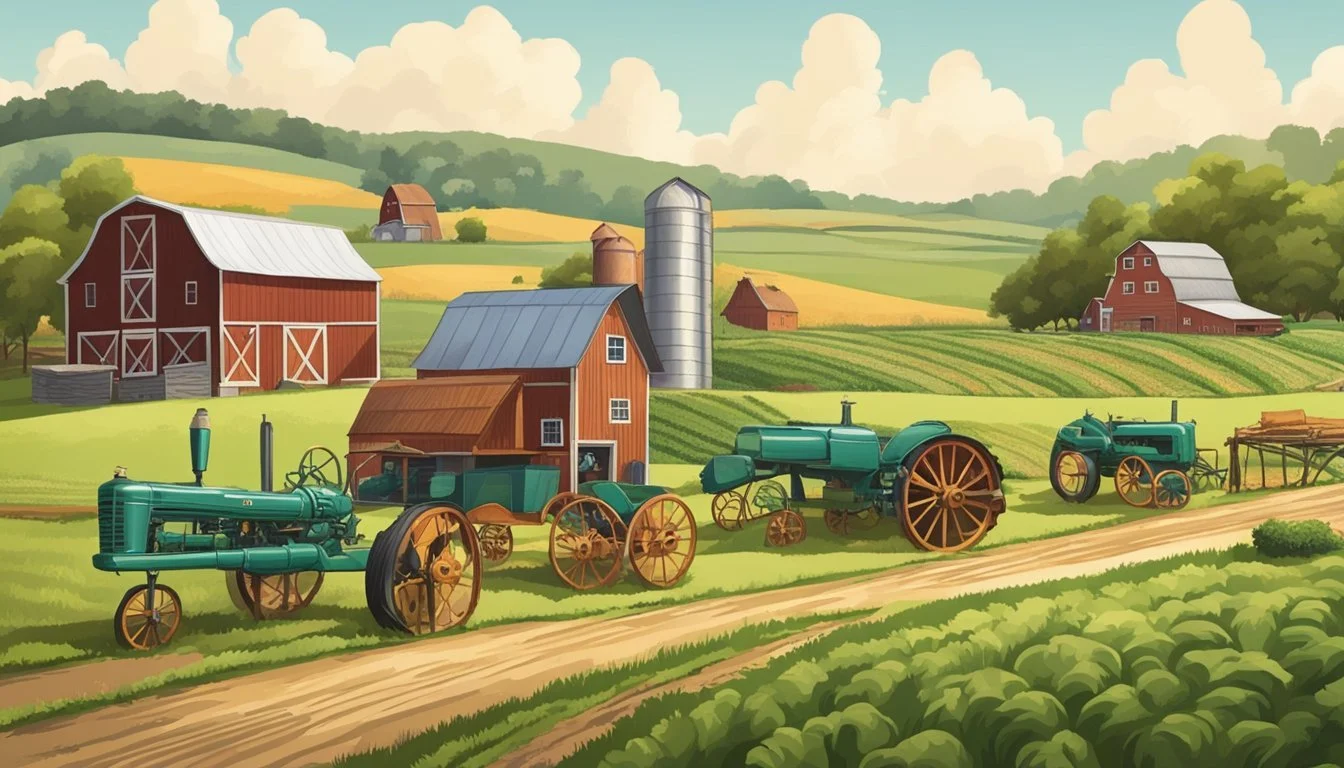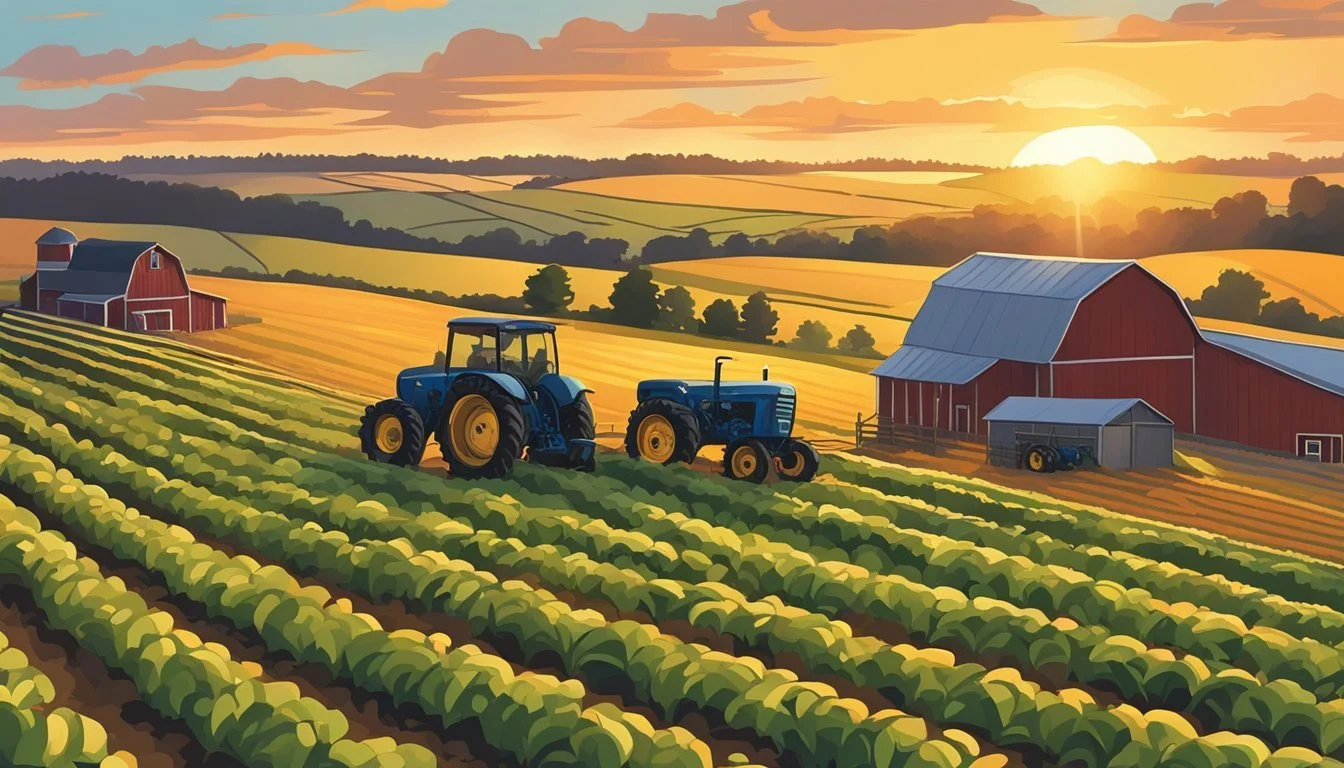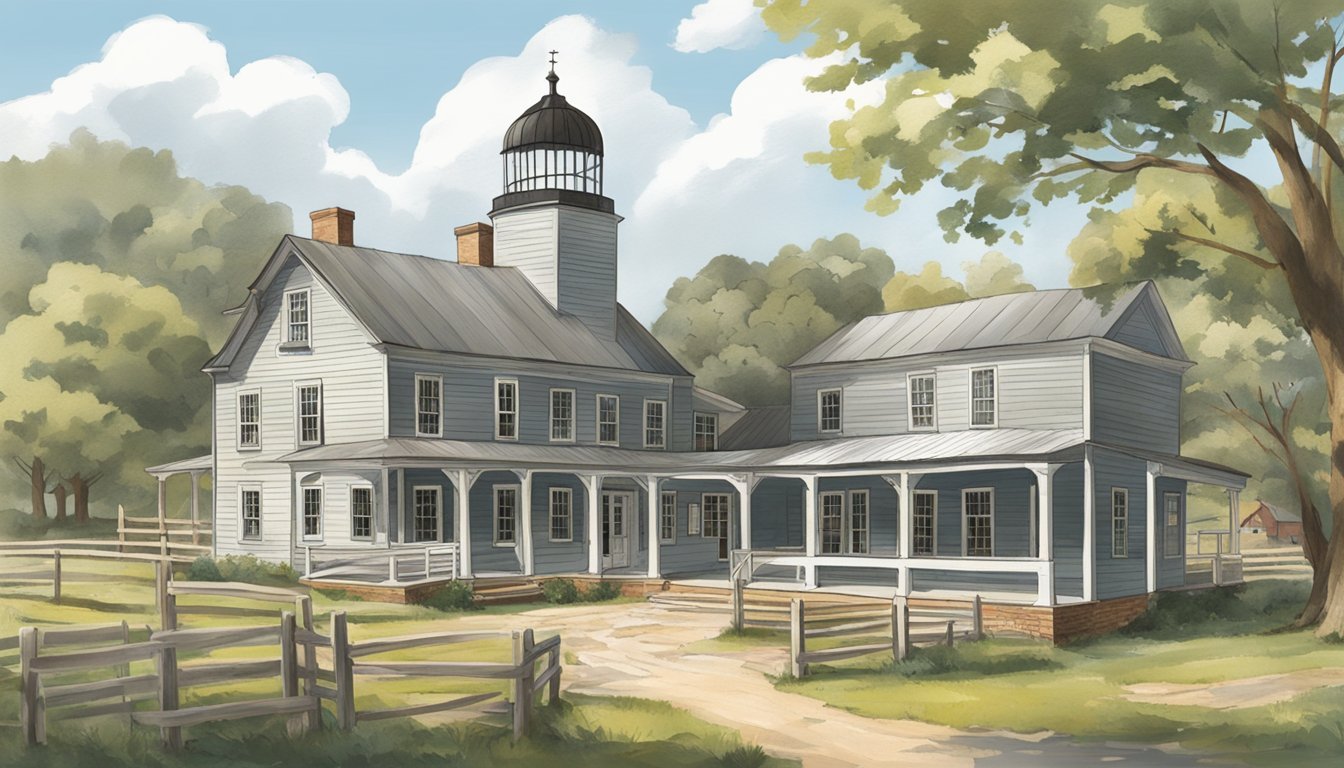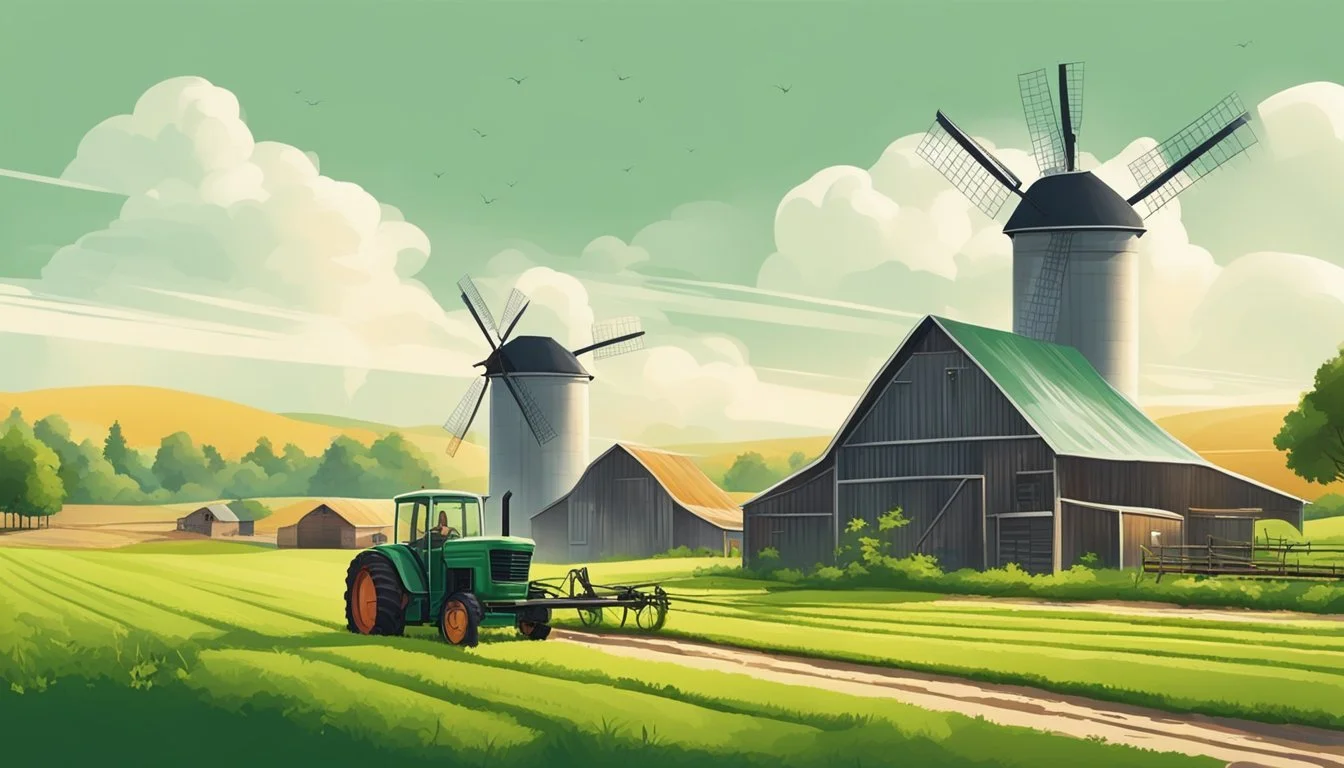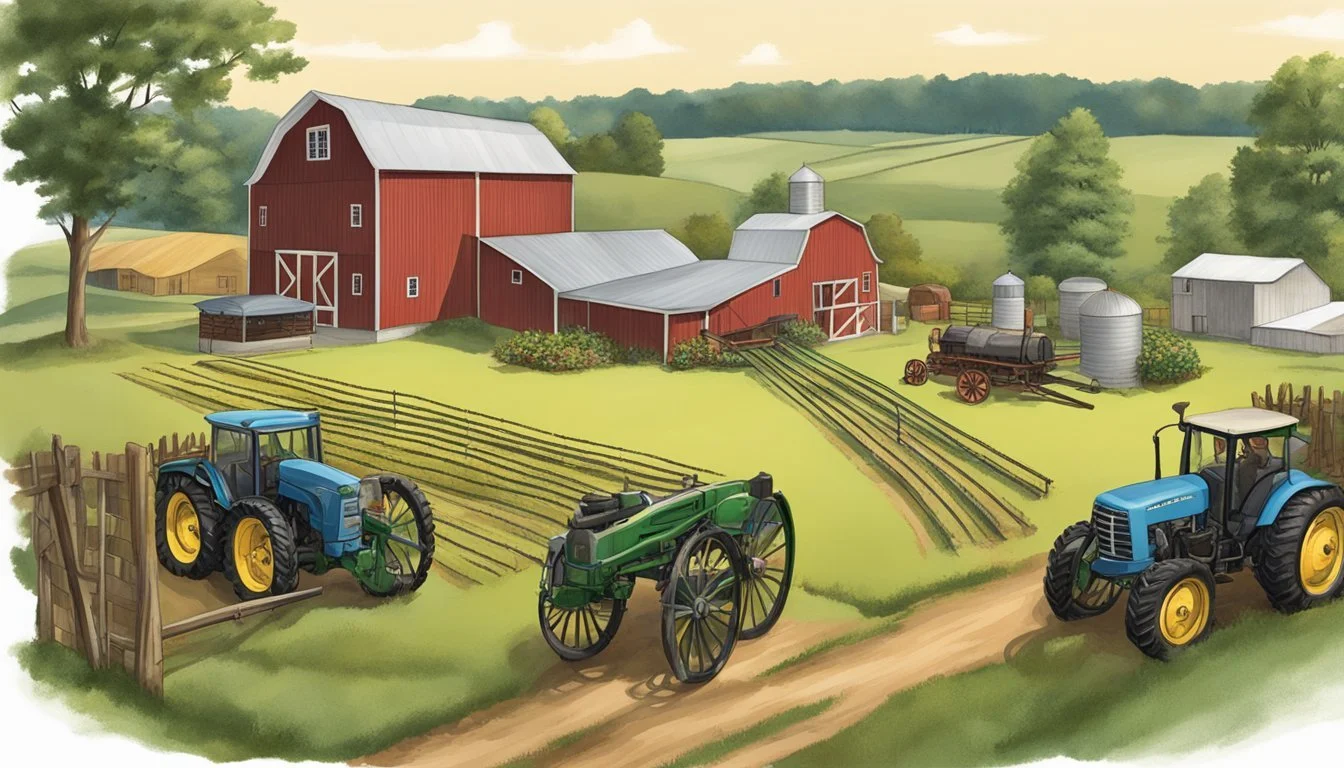Historical Farms and Agricultural Museums in Maryland
A Guide to Agrarian Heritage Sites
Maryland's rich soil and temperate climate have contributed greatly to its agricultural heritage, a legacy that is preserved and celebrated in several historical farms and agricultural museums across the state. These institutions serve as educational platforms, offering a window into the past to understand the evolution of farming practices and rural life. The Agricultural History Farm Park and the Howard County Living Farm Heritage Museum are prime examples of such preservation, offering visitors interactive experiences and a detailed look at Maryland’s farming history.
At the Agricultural History Farm Park, visitors gain insights into the lives of Montgomery County’s farmers from the late 19th century onwards. Exhibits and programs at this park reflect the blend of old and heritage with current and new techniques that illustrate the progression of farming. Meanwhile, the Association for Living History, Farm and Agricultural Museums (ALHFAM), although not limited to Maryland, plays a significant role in connecting these types of institutions, fostering a community committed to the preservation of agricultural history.
The Howard County Living Farm Heritage Museum, located in Central Maryland, until very recently, shared this dedication to preserving the region's farming past. Despite the termination of its lease at West Friendship Park, the responsible organization continues to champion the preservation of their agricultural heritage, indicative of the enduring commitment to Maryland's farming history and culture. Together, these entities and their support network emphasize the importance of understanding and preserving agricultural practices, offering Maryland's residents and visitors alike tangible connections to the rural and agricultural foundations of the region.
The History of Agriculture in Maryland
Maryland's agricultural history is rich and diverse, reflecting its unique blend of geographies and cultures. From its colonial roots to the transformative period following the Civil War, the state's farming heritage has played a pivotal role in shaping its economy and way of life.
Colonial and Antebellum Eras
In colonial Maryland, agriculture primarily consisted of tobacco cultivation, alongside other crops such as corn and wheat. Large land-holding families, such as the Brooke Family at "Falling Green," utilized enslaved labor for plantation farming, setting the economic and social structure of the state during this period. Small-scale subsistence farms coexisted with these large estates, diversifying the state's agricultural landscape.
Technological Advancements Post-Civil War
The Civil War marked a turning point in Maryland's agricultural practices. The abolition of slavery necessitated a shift toward increased mechanization and improved agricultural techniques. Agricultural History Farm Park reflects this evolution, showcasing past and present farming methods and technologies. Post-war advancements saw the introduction of new machinery, such as the mechanical reaper, which drastically increased efficiency and production capacity on Maryland's farms.
Key Historical Farms in Maryland
Maryland is home to a rich tapestry of historical farms and agricultural museums that showcase the state's farming heritage, important civil war history, and preserved architectural legacies.
Farm Parks and Open-Air Museums
Agricultural History Farm Park is more than a scenic backdrop of Montgomery County's rural beginnings; it stands as a pertinent educational resource. Visitors can experience both past and present agricultural practices while exploring the rolling hills, open fields, and an apple orchard, alongside a variety of farm animals.
King Barn Dairy MOOseum illustrates the evolution of dairy farming and its impact on the region. Through exhibits and educational programs, one can delve into the intricacies of dairy production and the importance of the industry in Montgomery County's development.
Civil War Era Farms
The era of the American Civil War is brought to life at specific sites where history is preserved. Although there are not direct search results provided for Civil War era farms, generally, such sites serve as immersive fields that enable visitors to understand agricultural life during the tumultuous 1860s.
Farms that function as part of civil war history often display period farming techniques and showcase the relevance of agriculture to the war effort. They are places of living history, where the preservation of buildings and landscapes allows for a contextual understanding of the time.
Legacy Farms and Plantations
Plantations and legacy farms often contain rich archives and examples of historical architecture relevant to Maryland's agricultural heritage. These locations provide insight into the former plantation economy and offer a perspective on the regional influence of farming.
The National Colonial Farm at Piscataway Park represents an authentic 17th-century plantation. Visitors can explore historic buildings, which serve as significant examples of colonial-era architectural preservation, while the farm underscores the daily lives of Maryland's early settlers.
The importance of agriculture in Maryland’s state history is underscored by the presence of these farms and open-air museums. They are instrumental in the preservation of history and serve as valuable resources for education and the appreciation of the state's agricultural legacy.
Agricultural Museums and Exhibits in Maryland
Maryland boasts a rich heritage in farming and agriculture, encapsulated within its diverse agricultural museums and exhibits. These venues offer a window into the past through an array of permanent collections, seasonal exhibitions, and special events and programs.
Permanent Collections
The King Barn Dairy MOOseum showcases interactive exhibits and educational programs that reflect Montgomery County's dairy heritage. Their permanent collection includes artifacts and stories of local farms, families, and businesses related to agriculture in the area.
Another notable institution, the Pue Fulton Farm Museum of the Howard County Historical Society features a historic farmhouse dating back to 1850 and includes several exhibit rooms with preserved artifacts that portray farm life over the centuries.
Seasonal Exhibitions
Montgomery Parks' Agricultural History Farm Park often hosts seasonal exhibitions that provide visitors a glimpse into farming throughout the year. From changing farming practices to seasonal crop cycles, these exhibitions educate on the ebb and flow of agricultural life.
Special Events and Programs
To immerse visitors further into the agricultural past, many museums conduct special events and programs. For example, the Center for Maryland Agriculture and Farm Park is a public park that illustrates agricultural and equine activities and organizes events that allow the public to participate in and learn about Maryland's agricultural traditions.
In addition, the Association for Living History, Farm and Agricultural Museums (ALHFAM) supports living history farms and offers programs that include workshops, conferences, and professional development opportunities aimed at preserving agricultural heritage.
Educational Programs and Community Outreach
Maryland's historical farms and agricultural museums serve as vital educational platforms, offering a diverse array of programs focused on agricultural heritage and practices. They actively engage the community through specialized workshops, school programs, and events that cater to various age groups and interests.
Workshops and Demonstrations
At the CCFMRAC, education takes a hands-on approach with workshops that teach traditional farming techniques using authentic tools. Demonstrations by skilled artisans provide a window into the past, highlighting the evolution of agriculture in Cecil County. Attendees can gain practical knowledge and learn about farming practices in a historical context.
School Programs
The King Barn Dairy MOOseum offers structured school programs designed to supplement curriculum and provide students with experiential learning opportunities. These programs range from guided tours to interactive activities that cover aspects of dairy farming and the importance of agriculture in local history.
Community Events
Living history farms, such as those involved with ALHFAM, often host community events that bring local traditions to life. These events serve as a forum for the organization to present agricultural history in a manner that encourages community participation and awareness. Montgomery Parks' Agricultural History Farm Park invites the public to seasonal festivals and markets that celebrate Maryland's farming culture.
Organizations and Associations
Organizations and associations dedicated to preserving historical farms and agricultural heritage play a critical role in the cultural landscape of Maryland. They serve as hubs for education, preservation, and community engagement.
Local and State-level Organizations
Local and state-level organizations focus on maintaining the integrity and public engagement of historical sites within Maryland. The Maryland Museums Association stands out as a key player. This volunteer-managed alliance includes institutions that collect and interpret the state's material and cultural heritage. They advocate for museum funding and equitable professional standards and push for authentic interpretations of shared histories. Their efforts are instrumental in fostering increased cultural understanding within the local community.
National and International Bodies
On a broader scale, the Association for Living History, Farm and Agricultural Museums (ALHFAM) operates both nationally and internationally. This non-profit organization is incorporated in the State of Maryland and extends its support beyond U.S. borders, including Canada. ALHFAM acts as a knowledge-sharing platform, uniting individual and institutional members involved in living historical farms and museums. Leveraging a diverse network of members, they facilitate participatory learning and the practical exchange of skills and research. This ensures that history remains relevant and accessible to contemporary audiences globally.
Preservation Efforts and Architectural Importance
Maryland's commitment to preserving its historical farms and agricultural buildings combines restoration excellence with a celebration of architectural heritage. These efforts ensure the survival of structures that are emblematic of the region’s past.
Restoration Projects
In Maryland, restoration projects of historic farms must adhere to meticulous standards to maintain the integrity and authenticity of the original structures. An example is the work done on historic barns, which are restored with a focus on accuracy, using materials and techniques that are true to the period in which they were built. These projects not only revitalize the buildings but also serve as educational platforms, showcasing Maryland's agricultural history.
Architectural Significance
Architectural significance in historical farms is not just about the age or beauty of the buildings, but also their representation of past agrarian lifestyles and construction methods. The National Colonial Farm, for instance, is a living history museum that provides insight into 18th-century farming practices through its preserved structures. Such sites highlight how agricultural architecture has shaped the economic and cultural landscape of Maryland.
Agricultural Technology and Innovation
Maryland's agricultural museums not only preserve the past but also educate on the evolution of farming tools and technology, from historic equipment to contemporary adaptations.
Historical Farming Equipment
A glance at the past reveals a variety of hand tools and horse-drawn equipment used in Maryland's farming history. Within the Agricultural History Farm Park, visitors can see plows, seed drills, and harvesting tools that show the ingenuity of early farmers. Each tool represents a step towards the mechanization of agriculture, reflecting the era's technology.
Modern Interpretations
Today, Maryland's agricultural heritage sites merge traditional methods with modern interpretations. Tools have evolved from simple hand-held devices to complex machinery. Farms like the Howard County Living Farm Heritage Museum provide insight into the technological advances in farming, showcasing how historical equipment laid the groundwork for today's precision agriculture tools.
Online Resources and Virtual Tours
Maryland's history is rich and diverse, with its agricultural heritage playing a significant role. For those unable to visit in person or looking to enhance their understanding from afar, many museums offer online resources and virtual tours.
Museum Websites
Online visitors can explore a variety of Maryland museums through their official websites. These online portals often provide extensive information on current exhibits, upcoming events, and educational programs. For instance, the Maryland Center for History and Culture offers access to Maryland's history resources from anywhere, allowing enthusiasts to explore local history through their digital presence. Similarly, the King Barn Dairy Mooseum, a heritage museum in Maryland, enables online guests to learn about Montgomery County's dairy farming history through its virtual offerings.
Digital Collections and Galleries
Several institutions have curated extensive digital collections and galleries that showcase various artifacts and historical themes. Interested individuals can peruse these digital collections to view high-quality images of artifacts and learn about their historical contexts. The Maryland Center for History and Culture archives a wealth of materials, ranging from the Civil War to themes like women's suffrage, allowing the public to access images of objects, documents, and photographs. The King Barn Dairy Mooseum presents a virtual tour, inviting virtual visitors to explore farm family histories and delve into the realm of dairy farming through pictures and stories.
Upcoming Events and Conferences
Maryland hosts a range of events for enthusiasts and professionals interested in historical farms and agricultural museums. Each event provides unique opportunities for learning, networking, and experiencing the tapestry of agricultural heritage.
2024 ALHFAM Annual Meeting & Conference
When: June 7 - 10, 2024
Where: Titusville, New Jersey
Details: Hosted by Howell Living History Farm, this conference invites members to engage with presentations and workshops focused on living history and skill preservation. There is also a virtual symposium scheduled for September 9 - 10. For more information, attendees can visit the conference details.
AIMA 2023 Conference (past event for reference)
When: October 13-18, 2023
Where: Locations in Himachal Pradesh and Punjab, India
Details: As an indication of the global span of these conferences, the 20th Congress was held across two locations with involvement from the Museum of Social History of Punjab.
It is important for interested parties to check the websites of these organizations and join mailing lists for the most up-to-date information, as events are subject to change. Additionally, they can reach out directly to The Association for Living History, Farm and Agricultural Museums (ALHFAM) which provides a wealth of resources and updates on various related activities and conferences.

